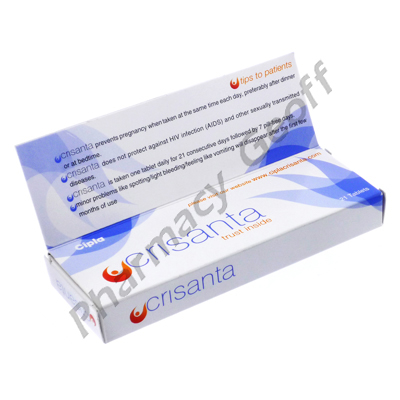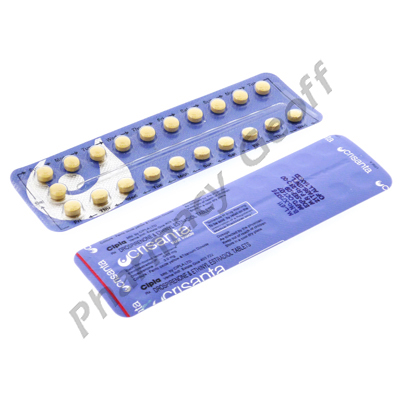What is Crisanta (Ethinylestradiol IP/Drospirenone)?
Crisanta (Ethinylestradiol/Drospirenone) is a female contraceptive pill used by women to help prevent pregnancy. When used properly it is over 99% effective. Whilst this pill will help to prevent an unwanted pregnancy, it will not protect those using it from contracting or transferring STDs (sexually transmitted diseases).
It works by inhibiting the ovaries from releasing eggs whilst also affecting the cervical mucus and altering the lining of the uterus making it more difficult for sperm fertilize the egg.
Crisanta (Ethinylestradiol IP/Drospirenone) Dosage and Administration
Strictly follow the directions of your physician, or alternatively carefully read the instruction contained with the packaging. Typically, patients take 1 tablet every day for 21 days consecutively before a break of 7 days (during which you may menstruate). After this break re-start the 21 day cycle again.
If you do not menstruate during the 7 day break, you should carry on as normal without breaking the cycle pattern. If you do not menstruate again the next time, consult your physician for advice. If you are taking this for the first time, you should begin on the first day of menstruation and aim to dose at the same time each day (for example, after dinner or before bed time).
If you start the pill on the first day of your cycle it will take effect by the second day. If you begin taking the medicine later in the cycle, you will need to use additional `barrier method` protection (such as condoms) for 7 days. Always take the pill at the same time each day. If you take it late, you will need to use additional form of protection (such as condoms) for 7 days whilst continuing to use the pill.
Crisanta (Ethinylestradiol IP/Drospirenone) Side Effects
Crisanta (Ethinylestradiol IP/Drospirenone) is usually very well tolerated and safe for use. Common side effects such as the ones below are usually mild and short lasting but you should tell your physician promptly if any worsen or become bothersome.
- Nausea
- Dizziness
- Vomiting
- Headaches
- Infections
- Rashes
- Bleeding between periods
- Changes to your appetite
- Changes to your vision
The following side effects are quite serious and you should inform your physician immediately if you experience any of them.
- Severe chest pains
- Severe headaches, vomiting, dizziness
- Fainting
- Bloody cough
- Difficulty breathing
- Calf pains
- Severe or rapid changes to your vision
- Changes to your speech
- Severe weakness or fatigue
- Insomnia
- Numb limbs
- Breast lumps
- Stomach pains
- Jaundice
- Fever symptoms
- Changes to your urine, urination, or stools
|







